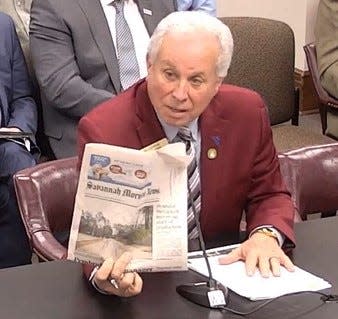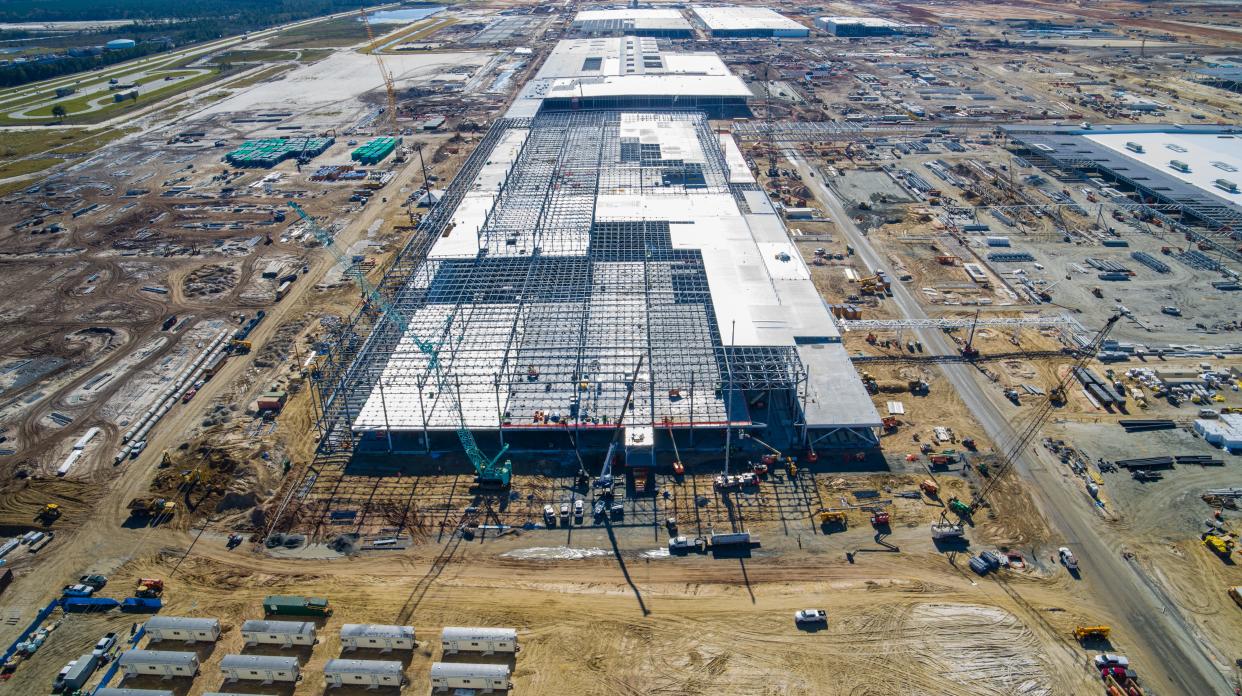Savannah's Stephens revisits false narrative in pushing private water service bill

For the second time in a two-week period, a Georgia legislator on Tuesday misrepresented the rationale for his proposed bill that would allow private companies to provide water service to new residential subdivisions in coastal areas without the approval of local governments.
In a hearing of the Senate Committee on Natural Resources and the Environment, Republican Rep. Ron Stephens of Savannah repeated his false assertion that a developer shelved plans for a 500-home community in Pembroke last month because Bryan County could not supply water to the subdivision.
After spending hundreds of thousands of dollars in the planning stages of the development, “they finally threw up their hands ... because there was just no way to get it done” without water from the county, which has exhausted its state-permitted capacity to withdraw from the Floridan Aquifer, Stephens told the committee.
House Bill 1146, he asserted, could save the project by eventually allowing a private utility to supply water without Bryan County signing off on the arrangement, as required by state law. That would kickstart efforts to provide new and reasonably priced “workforce housing” for thousands of future employees at Hyundai’s $5.5 billion electric-vehicle factory, he added.
But, as reported previously by the Savannah Morning News, water access played no role in developer James Dasher’s decision to withdraw his rezoning request.
Rather, Dasher said he feared Pembroke City Council members “weren’t ready to move forward with a project of this magnitude” after community backlash – all of which was reported in the front-page SMN story Stephens used as a visual prop on the House floor Feb. 29 and again in the committee hearing Tuesday.
Dasher planned to have his Fetzer Lakes community annexed into the city, which in turn would have installed water and sewer lines, at the developer’s expense, to serve the homes there. Pembroke, which gets its drinking water from neighboring Bulloch County, has sufficient capacity to supply the subdivision, City Manager Chris Benson confirmed this week.
But Tuesday, Stephens doubled down on his claim from two weeks earlier that Fetzer Lakes was a casualty of Bryan County’s water woes that could only be resuscitated by the passage of HB 1146.
“So, I'm asking you to consider this bill and pass it on to the (Senate) Rules Committee so that we can get on with getting water and sewer for this workforce housing project,” he said.
The panel voted 9-4 to do just that.
Stephens did not respond to requests for comment about his claims related to the Fetzer Lakes development.
The primary benefactor of the legislation would be Savannah-based company Water Utility Management, which serves 32,000 homes in 17 Georgia counties.
Water Utility Management CEO Mark Smith, also chairman of the board for the Savannah Convention Center, sat alongside Stephens as he made his case for HB 1146 Tuesday.
“What this bill does is prevent the county from having a veto power over a private system,” Smith said.
The revised rule, which would apply exclusively to projects drawing water from “coastal aquifers,” would end in 2029.

Acceleration: Hyundai Motor Group Metaplant America moves up start of production
'Unplanned and irresponsible industrialization'
Opponents of HB 1146 left the hearing in frustration – and not just because state senators supported the measure.
Committee Chairman Lee Anderson, a Columbia County Republican, told those planning to testify against the bill they could be represented by just two speakers who would each be allowed two minutes for comments. That effectively silenced a group of people who’d traveled more than 200 miles to express their views during the session.
Ogeechee Riverkeeper Damon Mullis said he had a particularly hard time squaring the four minutes granted for opposition statements related to actual legislation with the nearly 20-minute presentation by a high school student about a camp for children with cancer that followed the HB 1146 discussion and vote.
“This is not how democracy is supposed to work,” he said.
In terms of the legislation itself, Jennifer Hilburn of the organization 100 Miles argued that uncoordinated development fueled by the availability of private utilities could lead to unchecked growth in an area already facing an impending surge in population.
“It’s true that our local coastal leaders have been swept up in a gold-rush, frenzied, unplanned and irresponsible industrialization of the north coast with no multi-jurisdictional planning in anything other than economic development,” she said.
Kristen Stampfer told senators she feared having the water under her small Bulloch County farm “sold to the highest bidder.”
“Of all the farmers’ struggles, I never thought water, here in this country, would be a major one,” she added. “Water is a right to life and should be treated as such.”
More digging? Four wells might not be enough for Hyundai's Savannah-area factory, state says
'We're used to growth'
While Stephens revisited his false narrative in plugging the bill Tuesday, he accurately noted that Bryan County does not have available capacity tied to its state water permit.
Bryan – along with Chatham and a portion of Effingham counties – is subject to caps on what it can take from the Floridan Aquifer.
The Georgia Environmental Protection Division set the limits in 2013 after an investigation determined the Savannah area’s overuse of the aquifer was largely to blame for saltwater intrusion of the Floridan.
That’s why four proposed aquifer wells that would supply as much as 6.6 million gallons of water per day to Hyundai’s electric-vehicle plant are planned for Bulloch County.
In its draft permit for those wells, EPD “strongly encourages” both counties to work with the state to identify and connect to new sources of surface water to accommodate growth without further stressing the Floridan aquifer.
Supporters consider HB 1146 a bridge for drinking water in northern Bryan County as those efforts proceed, and as the need to house Hyundai employees multiplies.
Bryan County, home to about 45,000 people, is in the midst of a $360 million expansion of its water system to serve “additional development, workforce housing and the like” on more than 30,000 acres surrounding the Hyundai complex, Trent Thompson, an engineering consultant overseeing the project, said during Tuesday’s hearing.
County Administrator Ben Taylor told the panel “we’re not here to oppose any type of legislation.” But Thompson noted that revenue from a growing customer base for county water would be crucial in repaying $120 million in loans tied to the system expansion.
Taylor noted that growth in Pembroke, Richmond Hill and unincorporated areas already is leading to 600 new homes per year in Bryan County.
“Our little water system we started eight years ago ... went from about 200 customers to close to 2,000, so we’re used to growth (and) we’re used to delivering,” he added.
John Deem covers climate change and the environment in coastal Georgia. He can be reached at jdeem@gannett.com
This article originally appeared on Savannah Morning News: Savannah's Stephens revisits false narrative in pushing water bill
